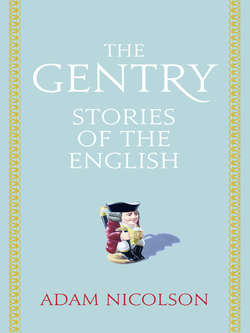Читать книгу The Gentry: Stories of the English - Adam Nicolson - Страница 8
ОглавлениеThe high Middle Ages, from about 1100 until about 1300, had been blessed with golden summers and mild winters.1 That beautiful warmth in the northern hemisphere had created both the great cathedrals of Europe and the contemporary surge far to the east in the population of the Mongol steppes. By the early fifteenth century, though, bleaker conditions prevailed, so that the growing season was at least three weeks shorter than it had been 150 years before. Winters were sharper and summers wretched. One winter in the 1430s a frost lay over London unbroken from the middle of November until the middle of February. The Thames froze solid and the French and Gascon wines usually delivered by ship to the Vintners’ wharves in the centre of the city had to be brought in by wagon through Kent. Frost in May, when flowers on vines are at their most vulnerable, had been unheard of in England in the twelfth and thirteenth centuries. By 1400 it was common, even usual, and the vineyards disappeared from England. The Norwegians and Icelanders were finding ever more summer icebergs on their route to Vinland, while the English and other northern Europeans suffered from wetter summers, low productivity in their difficult and heavy lands, a shortage in seed corn, a deficit in calories, a dimming in the spark of life and a shrinkage in rents.
Walk over the Plumpton lands in Yorkshire and Nottinghamshire now in the early spring and the clay thickens around your boots: England was never the easiest of land to work. Even though the fourteenth-century epidemics of plague had savagely reduced the number of Europeans, a century later villages, particularly those on north-facing slopes or at some altitude, were still being deserted. The continent was short of money and the general crisis of authority which spread across the whole of Europe, the bitter squabbling over lands and lordships which marked the end of Middle Ages, may have been simply the reaction of a human population to the most difficult of planetary changes: global cooling. The story of William Plumpton and his family may be a private reflection of a world in bio-climatic decline.
The governors were still for the time being the crown, the church and the great lords. Between them they owned over half the country. Gentry like the Plumptons were dependent on them, feudally attached, and owning no more than 20 per cent of the land themselves, the same as the yeomen farmers in the social stratum below.
It was a legalized and commercial world – lawyers appear at every turn – but at the same time one heavily dependent on personal prestige and power. Law, for all its complexity and expense, was chronically vulnerable to the corruptions and distortions of big men’s threats. A glowing Arthurian vision of nobility and gentleness may have floated over these people but more as a longed-for world than a reflection of their own reality. Members of the medieval gentry can seem at times like little more than armed businessmen, gangsters on horseback, cannily in tune with the ways of the law but usually prepared to assert their will through their own and their gangs’ physical violence.
Of all the great medieval letter collections that survive, those of the Plumptons reveal these desperate conditions, a frontier existence in which personal extinction and the possibility of an entire family being extinguished did not seem like a distant prospect. As the authority of the English crown, weakened by the personal unworldliness of Henry VI, collapsed around them, and the great magnates fought themselves to a standstill, gentry families were caught in the backwash of chaos. Different branches of the Plumptons ended up facing each other in a pair of long, growling and destructive court cases, which is why most of these documents survive, gathered in evidence by the teams of opposing lawyers. That is also why little of the sweetness and elegance of life is apparent here. Not all of England was like this – typicality cannot be read from any of these families – and there are alternative visions. Englishmen, according to the Tuscan historian Polydore Vergil, writing at the very beginning of the next century, were
tall, with handsome open faces, grey-eyed for the most part. Their women are snow-white and handsome, and graced with the most decent apparel. And just as they are very similar to the Italians in the sound of their language, so the build of their bodies and their manners do not greatly differ from theirs. They have fine manners, they take counsel with deliberation (since they know that nothing is as inimical to counsel as haste), they are gentle and inclined by nature to every act of kindness.2
That is not what it seemed like in the world of the Plumptons.
